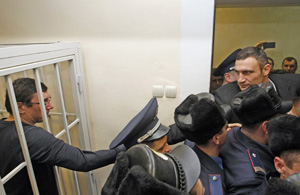Lutsenko case
Unexpected reverberations
Almost all Ukrainian media are busy discussing the Pechersk District Court’s ruling in the case of ex-Interior Minister Yurii Lutsenko, offering forecasts about the current administration’s intentions in regard to its political adversaries. The fact remains that few if any look at this event and its consequences at a different angle.
On the night of February 25, when Ukraine’s government-run Channel One and Channel Inter were broadcasting an interview with President Yanukovych (who said, among other things, that democracy, law and order were showing “adamantine progress” in Ukraine), what was left of Vasyl Stus Public Garden was destroyed. Official reports have it that 84 trees were cut down in the absence of proper authorization papers. Eyewitness reports have it that a group of unidentified persons cut down some 90 big and 60 young trees during the night. On February 16, this section of the public garden, located on the crossing of Perehoma [Victory] and Academician Paladin avenues, was fenced off by an unidentified team. The public prosecutor’s office says it’s an area of 0.4 hectares leased by a private business known as Energoincome Ukraine. This business is likely to have paid for the cutting down of the trees. Back in 2008, the Kyiv City State Administration, headed by the “cosmic” mayor, allowed ETREX to cut down 147 trees, clear a total of 100 square meters of verdure, and 1,540 square meters of lawn. That was when the bigger part of the public garden was destroyed to allow room for the construction of yet another shopping and entertainment complex, but some of the legally required paperwork was found wanting. In March 2009, after Vitali Klitschko’s faction lodged a complaint with the Kyiv City State Administration, the public prosecutor’s office started criminal proceedings on chargers of unlawful felling of trees. In fact, PPO says criminal prosecution has started against those who cut down the trees this time, on charges of damage to the state worth 120,000 hryvnias.
What will be the outcome of both criminal cases (considering that this public garden is named for Vasyl Stus, a victim of the Soviet regime)? A rhetorical question. Last year it was answered by Justice Serhii Vovk, the one who presided over the Lutsenko trial and who had placed on probation a bureaucrat caught red-handed, receiving a bribe worth 140,000 hryvnias. That bureaucrat held an important post and was paid for issuing farming land title certificates. He was battle-hardened and smart enough to send a lower-ranking bureaucrat to meet with the clients. The money changed hands, but then the SBU stepped in. The Ukrainian secret police had been closely following the whole affair.
As it was, Justice Serhii Vovk ruled that the lower-ranking bureaucrat who had received the bribe and brought the money to his boss, and was thus on trial, charged with complicity, was innocent; that he allegedly had no idea about what was in the briefcase he brought and in the one he received (a switch made in keeping with the best security rules), that the one he was given contained 140,000 hryvnias.
Justice Vovk had to admit that the incriminating evidence against the key defendant was sufficient and that the man was guilty as per Section 2, Article 368 of the Criminal Code of Ukraine, and sentenced him to five years in prison, depriving him of the right to occupy any central or local executive or law enforcement post for a term of three years, and ordered all his property confiscated.
Justice Vovk’s attitude to the Lutsenko case was the exact opposite, especially his ruling.
Even if both cases, concerning the felling of trees in Vasyl Stus Public Garden, reached their lawful conclusion – assuming that the court would rule as dictated by law – one can hardly expect the perpetrators to suffer any legal punishment, simply because they are the current administration’s chum buddies. Otherwise they would have never even thought of damaging public property that way. Otherwise Justice Serhii Vovk would have never dared pronounce his ruling, at a time when those “upstairs” were making vociferous statements about making every effort to combat corruption. Bottom line: the worst the perpetrators can expect is fines and short prison terms that will be quickly commuted to probation.
Apart from fair governance and adjudication in Ukraine, the question remains: “Will the residents of Kyiv have Vasyl Stus Public Garden?”
Ihor LUTSENKO, activist, Preserve Old Kyiv public movement:
“In fact, the Kyiv Prosecutor’s Office has made a mistake. This isn’t Vasyl Stus Public Garden. This area is very close, diagonally, to it, on a road interchange. There are documents to the effect that a filling station will be built there, but people keep talking about a shopping mall complete with a playground and parking lot. Whatever they’re going to build makes no sense in terms of safety, let alone lawfulness. There have been protest rallies, but I think their organizers should lodge a complaint with a court of law. This area isn’t fit for such construction projects because it is practically in the center of the interchange, so that any construction activities will obstruct traffic. We visited the place several days prior to the felling of the trees and held a news conference. In other words, there was enough information made public to prevent the cutting down of the trees, but this didn’t help.”
The Day has asked the Kyiv City State Administration and Energoincome Ukraine for comment and will keep its readers informed.






